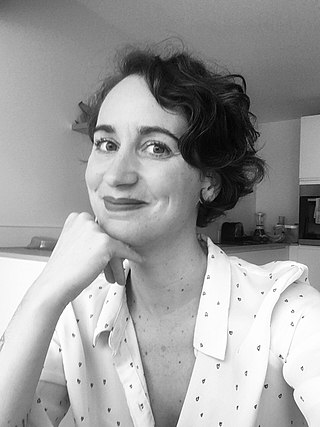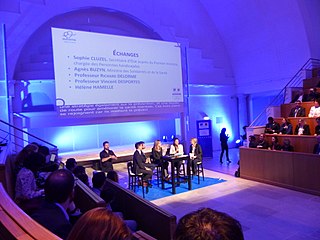The International Psychoanalytical Association (IPA) is an association including 12,000 psychoanalysts as members and works with 70 constituent organizations. It was founded in 1910 by Sigmund Freud, from an idea proposed by Sándor Ferenczi.
Jean Laplanche was a French author, psychoanalyst and winemaker. Laplanche is best known for his work on psychosexual development and Sigmund Freud's seduction theory, and wrote more than a dozen books on psychoanalytic theory. The journal Radical Philosophy described him as "the most original and philosophically informed psychoanalytic theorist of his day."

Jean-Claude Maleval is a French Lacanian psychoanalyst, member of the École de la Cause Freudienne and emeritus professor of clinical psychology at the University of Rennes 2.
André Green was a French psychoanalyst.

Françoise Dolto was a French pediatrician and psychoanalyst.

Élisabeth Roudinesco is a French scholar, historian and psychoanalyst. She conducts a seminar on the history of psychoanalysis at the École Normale Supérieure.

Juan-David Nasio is an Argentinian psychiatrist, psychoanalyst and writer. He is one of the founders of Séminaires Psychanalytiques de Paris.
Charles Baudouin was a French psychoanalyst and pacifist. His psychoanalytical work combined Freudianism with elements of the thought of Carl Jung and Alfred Adler.

Ángel Garma Zubizarreta, most widely known as Ángel Garma was a Spanish-Argentinian psychoanalyst who has been called the 'founder' of psychoanalysis in Argentina. He wrote on psychosis, psychosomatic illnesses such as gastric ulcers and headaches, and dream interpretation.

Moustafa or Moustapha Safouan was an Egyptian psychoanalyst.

Antoine Vergote, also known as Antoon Vergote, was a Belgian Roman Catholic priest, theologian, philosopher, psychologist and psychoanalyst. He was an Emeritus Professor at the Catholic University of Leuven. His extensive publications span multiple disciplines including psychoanalysis, hermeneutics, philosophical anthropology, linguistics, theology, cultural anthropology, and phenomenology.
Raymond de Saussure was a Swiss psychoanalyst, the first president of the European Psychoanalytical Federation. He is the son of the famous linguist Ferdinand de Saussure, and a student of Sigmund Freud.
Laurent Mottron in France, is a psychiatrist, researcher, and a professor at Montreal University. He is a specialist in cognitive neuroscience research in autism at the University of Montreal.
Jean-Gerard Bursztein is a French psychoanalyst who has a doctorate in philosophy. He teaches psychoanalysis and practices in Paris. He was a student of Jean-Toussaint Desanti and worked on both philosophy of mathematics and philosophy of science. He continues to explore this field in studying the intrication of psychoanalysis and mathematics. On the basis of his practice he has written the following publications :

Per Magnus Johansson is a Swedish psychoanalyst, psychotherapist and historian of ideas. Through his research on the history of psychoanalysis in Sweden, Johansson has contributed to the understanding of the heritage of Sigmund Freud and the psychoanalytical movement in the 20th century. Johansson's psychoanalytical training took place in Paris, where he completed a training analysis with Pierre Legendre. On Pierre Legendres passing in March 2023, Johansson published an obituary in French, Italian and Swedish describing Legendres contributions to the Freudian legacy.
Gabrielle "Gaby" Clerk was a Canadian psychologist and professor of psychology at the Université de Montréal. She was one of the first psychoanalysts in Canada.

Approximately 12 million French citizens are affected by disability. The history of disability activism in France dates back to the French Revolution when the national obligation to help disabled citizens was recognized, but it was "unclear whether or not such assistance should be public or private." Disabled civilians began to form the first associations to demand equal rights and integration in the workforce after the First World War. Between 1940 and 1945, 45,000 people with intellectual disabilities died from neglect in French psychiatric asylums. After the Second World War, parents of disabled children and charities created specialized institutions for disabled children for whom school was not accessible. In 2018, the French Government began to roll out a disability policy which aimed to increase the allowance for disabled adults to €900 per month, improve the digital accessibility of public services, and develop easy-to-read and understand language among other goals.
Annie Anzieu was a French psychoanalyst and essayist who published a series of psychoanalytic studies.

Julie Dachez is a French social psychologist, lecturer and autism rights activist. She's the author of Invisible Differences and Dans ta bulle!. In 2016, she became the first openly autistic person to defend a thesis on the subject in France.

The history of autism in France is marked by the strong influence of psychoanalysis, and by the persistence of institutionalization practices that violate the fundamental rights of autistic people. According to estimates at the end of 2016, 0.7 to 1% of the French population has an autism spectrum disorder, most of which is undiagnosed, leading to varying degrees of disability.










